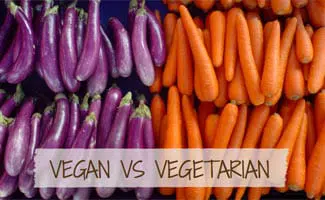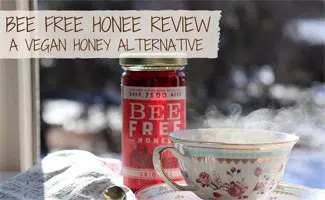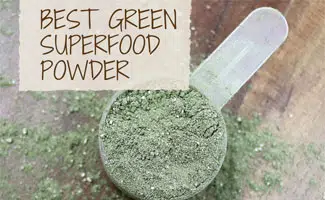When you purchase through links on our site, we may earn a commission. Here’s how it works.

Vegan vs Vegetarian
A vegan is someone who does not eat or use animal products. Veganism is often a life choice rather than simply a dietary choice. When it comes to eating however, veganism almost always offers a more limited eating choice than vegetarianism.
A vegetarian is someone who does not eat meat or meat-based products. Occasionally vegetarians will also opt not to eat other animal products as well. Unlike veganism however, vegetarians do not generally extend their dietary choices to other areas of their life such as clothes they wear and the personal products they use. There are three subcategories of vegetarians in addition to general vegetarianism: lacto-vegetarians, ovo-vegetarians and lacto-ovo-vegetarians.
Vegetarians that still consume milk and/or eggs generally do so under the caveat that these products are free range, hormone free and organic in nature. These products ensure that animals are not mistreated during their production. While these items are obtained from animals, they do not result in the death of the animal providing them and they do not support unhealthy and inhumane animal conditions.
Saying that there is a “nutritional difference” between veganism and vegetarianism is tricky because the nutrition one gleans from a diet is based upon how they eat when on that diet. For example, the vegetarian with a lack of variety in their diet may well be experiencing symptoms of poor nutrition where a vegan with a range of variety in their diet may be nutritionally balanced. Overall it is recommended that all individuals who consume a vegan and vegetarian diet consult a nutritionist and supplement their diet with vitamin supplements. Supplements of most concern for vegans are amino acid supplements and B12 supplements since these vitamins are obtained for most people through animal based products.
Vegan Video
This 5 minute video “nugget” from Bite Size Vegan is a little extreme, but does a good job of explaining why consuming dairy products including milk and eggs is still as cruel (if not more so) than eating meat itself.
Other Types of Vegetarians
Much of the confusion between veganism and vegetarianism occurs due to individual interpretation of what each term means. There is also a degree of confusion based on what the subsections of vegetarianism mean. Many times people get the terms lacto-vegetarians, ovo-vegetarians and lacto-ovo-vegetarians backwards believing that ovo-vegetarians will not eat eggs and vice versa. Here are some other types of vegetarians and what they eat (or do not eat).
Lacto-Vegetarians
Lacto-vegetarians do not eat meat or meat-based products but they also do not eat eggs. This type of vegetarian does, however, consume dairy products.
Ovo-Vegetarians
Ovo-vegetarians do not eat meat or meat-based products but they do not eat dairy based products. This type of vegetarian does consume eggs and is considered the opposite to lacto-vegetarians.
Lacto-Ovo-Vegetarians
Lacto-ovo-vegetarians do not eat meat or meat-based products; however, they do eat dairy and eggs.
Pescatarians
Pes-ca-tarians eat vegetables and fish.
A few members of our team eat pescatarian but also eat bacon… is this a Baconatarian?!?
Semi-vegetarians
Some people choose to live a less limited version of vegetarianism, these individuals are called semi-vegetarians. Semi-vegetarians generally eat dairy products, eggs, fish and chicken but they do not eat red meat. Most often people choose semi-vegetarianism because they do not care for red meat or they have health requirements that dictate they avoid red meat. Semi-vegetarians seldom opt for this dietary choice out of concern for animal well-being since many chickens are produced in deplorable conditions.
Why Choose Veganism or Vegetarianism?
There are many reasons that people choose to live a vegan or vegetarian diet, take a look at some of these reasons below.
A Compassionate Choice
The biggest reason that many individuals give for choosing veganism or vegetarianism is that it is a compassionate choice. In fact, the majority of people who choose these types of diets do so after witnessing the conditions under which farmed animals are treated. While not all animals are kept in deplorable conditions, there are many that are and vegans take a stand against these conditions by refusing to fund industries that support them.
Animal Conditions
Intelligent and feeling animals are many times kept in such overcrowded pens that they have little or no room to move. This overcrowding not only leads to unhappy animals but it also leads to unhealthy animals as well. When one animal kept in these cramped quarters contracts an illness it is not long before the neighboring animals also contract that illness. In addition to these consequences of environment, many times these animals are engineered to produce more meat or more milk and this engineering practice can lead to illness or death. By pumping animals full of hormones and other substances in order to increase their production or mass, farmers are shortening the animal’s lifespan and exposing them to painful and devastating side effects.
Conditions Found in Slaughterhouses
It is not only the conditions of the quarters where animals are kept that incite frustration among vegans and vegetarians. Overworked and underpaid slaughterhouse workers are often frustrated with their jobs and mistreat animals coming through the slaughterhouse lines. Those that are not “mistreated” as such are haunted by the sounds, smells and sights of the animals slaughtered before them. Many believe that the ritual slaughters that take place in kosher and halal plants are free from cruelty; however, this is not the case. Many times these animals survive initial slaughter methods for minutes, experiencing pain and being aware of their surroundings.
A Great way to Improve Overall Health
Consuming more of these fresh foods will ensure that your body takes in enough of the basic vitamins and minerals it needs to function normally. In addition many fruits and vegetables have been proven to have preventative and curative effects on health conditions such as heart disease, obesity and high cholesterol.
Simply a Healthier Eating Choice
Many food options today are based upon speed which means grabbing a meal from the closest or cheapest fast food restaurant and eating on the go. These fast food meals are more often than not crammed full of saturated fats, high levels of cholesterol and more calories than the average person should take in during a single meal. Conversely, many of the vegan or vegetarian eating options are low-fat, low cholesterol and low-calorie food choices. The reason that there is such a stark difference between non-vegan/non-vegetarian eating and vegan/vegetarian eating is the result of how food is prepared. Many of the traditional fast foods are fried to give them flavor or covered in salts and seasonings. Alternatively, healthier eating choices such as salads and vegetable based dishes focus upon bringing the natural flavor out of the produce giving it a clean and fresh taste.
Less Packaging and Manufacturing Pollution
There are a number of reasons why veganism and vegetarianism are believed to be a better choice for the environment. The most obvious of reasons is that fresh foods are much less demanding on the environment than pre-packaged foods. The amount of materials used to create packaging for pre-packaged foods and the amount of pollution created during the manufacturing process is devastating on the environment. There are a few manufacturers that utilize green manufacturing; however, until the vast majority of manufacturers turn to this production method veganism and vegetarianism will always be better for the environment.
Less Deforestation, More Biodiversity and Improved Soil Health
The amount of land that is required to sustain livestock is a major cause of deforestation. Creating pastures for animals to graze and crops to feed this livestock is draining on natural resources. As land becomes utilized increasingly for crops to feed livestock, less diversity is seen in crops that are produced and soil becomes degraded. Vegetarianism and veganism, while they do rely upon the soil and land, they have a significantly lower toll as they promote healthy crop growth practices and organic farming. Check out some of these amazing environmental facts regarding agriculture and the environment.
Reduced Water Use
According to the Livestock, Environment and Development Initiative animal agriculture accounts for 8% of human water use around the globe. 8% may not sound like a lot but it is important to take in to consideration a few factors. According to the Website for Global Change at the University of Michigan:
- only 2.5% of the world’s water supply is fresh water.
- 70% of the world’s water supply is frozen in Antarctica and Greenland.
- less than 1% of the world’s fresh water supply is available for direct use by humans.
Reduced Energy Use
The amount of energy that goes in to producing livestock for meat is considerable in comparison to the amount of food that is produced.
A Vegan or Vegetarian Diet Tastes Better
Those who have lived a vegan or vegetarian lifestyle for a period of time will attest to the fact that these diets offer much tastier food options. This is certainly not always true for everyone; however, it is generally based upon the fact that those who consume meat often opt for fast foods and unhealthy food choices. These processed foods and fast foods often contain significant amounts of salt and artificial flavoring where vegan and vegetarian foods are more often fresh and natural. Fresh food diets truly emphasize the natural flavor of foods rather than the manufactured flavors of processed foods.
Veganism and Vegetarianism as a Religious Choice
For many people veganism and vegetarianism is a religious choice. Lacto-vegetarian diets are particularly common among Eastern religions including Buddhism, Sikhism, Hinduism and Jainism. These religions hinge upon the concept of non-violence and the valuation of all human life. In Hindu culture particularly there is the belief that a person’s personality is the direct result of the food that they consume and eating the flesh of a once living being is bad for a person’s wellbeing.
Jainism is an Indian religion that has much more strict rules and regulations that determine what can and cannot be eaten. Jainism focuses on the constant need to help the soul travel towards divine consciousness and liberation. Jainism allows subscribers to eat only fruit and leaves that can be removed from a tree or plant without killing the tree or plant itself.
All of these religious beliefs have their own doctrines but most of all they emphasize a need to reduce or eliminate completely the suffering of any living thing.
Common Myths about Veganism and Vegetarianism
There are many stories that people create about their vegan and vegetarian friends but for the most part, these eating practices and beliefs are fairly straightforward and easily justified by one’s ideals. Let’s take a look at some of the more common myths.
Vegans and Vegetarians Can’t Eat Processed Foods
There is a belief that vegans and vegetarians cannot eat processed foods and must rely upon freshly cooked meals any time they want to eat. This is simply not the case. Many vegans and vegetarians eat specialty frozen and refrigerated food stuffs made with veganism and vegetarianism in mind. While these foods are not as healthy as fresh foods, they are a good option for those on the go.
All Vegetarians and Vegans Supporters of PETA
One question that is often asked in regards to vegans and vegetarians is whether or not they are all associated with PETA. After reviewing information on why people choose to become vegans and vegetarians this is obviously not the case. It is also important to note that the preconceived notions that many of us have about individuals in PETA are generally stereotypes. While some choose to become vegetarians and vegans out of concern for the ethical treatment of animals, some choose the lifestyle for reasons that have absolutely nothing to do with animals.
It’s Impossible to Get Enough Protein on a Vegan or Vegetarian Diet
While vegans and vegetarians do not get their protein from animals, there are many food options that provide plant proteins. This type of protein has lots of benefits too since it is low in fat, high in fiber and free of cholesterol.
Vegans and Vegetarians Experience Poor Nutrition and Stunted Growth
Many years ago it was believed that meat was necessary as a part of a healthy and nutritionally sound diet. Today, however, there is much more information available pertaining to veganism and vegetarianism including how to achieve proper nutritional balance through food variety and supplementation.
Milk is Necessary for Healthy Levels of Calcium
This belief pertains to vegans who do not consume any animal products including milk. For years we have been convinced that milk is necessary as a part of a healthy diet and the only available source of calcium. However, calcium can easily be obtained from many vegetables, leafy greens, legumes, fruits, seeds and nuts!
Veganism and Vegetarianism is Unsafe for Infants and Children
This belief generally stems from the idea that poor nutrition results from veganism and vegetarianism. All around the world in a variety of cultures infants and children are raised on strict vegan or vegetarian diets and experience no negative health effects. With adequate food variety (and supplementation when needed) everyone can live healthily on a diet that is animal product free.
Vegetarians and Vegans are All Skinny
One myth than many vegans and vegetarians find amusing is the belief that all vegans and vegetarians are skinny, this is simply not true. Meat does not make someone “large” or even “normal” sized, the amount and type of foods that we eat, the amount of exercise we take part in and the presence of various illnesses determines how large or small we are. It is very possible for vegans and vegetarians to overeat and become overweight or experience health conditions such as uncontrolled diabetes that cause them to gain weight.
Can World Hunger Be Solved with Veganism and Vegetarianism?
A number of people believe that the world’s problems with hunger could be solved if everyone chose a vegan or vegetarian diet. Is this true? There are varied opinions on this topic; however, there is no doubt that this change would impact the world’s food supply. There are those who believe that a reduction in land use for livestock would result in more efficient land use for the production of natural foods.
Deciding if Vegetarianism or Veganism is the Right Choice for You
Deciding whether to be a lacto-ovo vegetarian, a semi-vegetarian, a lacto-vegetarian, an ovo-vegetarian, a vegan or none of the above is a personal decision. The choice of what to eat should be based upon personal feelings, nutritional needs and medical demands. Just as it is unfair to judge someone for their decision to eat meat; it is equally unfair to judge someone for their choice not to eat meat. When debating whether vegetarianism or veganism is the right choice for you, take a look at the reasons you have for making this dietary choice and the foods you would eat with each option. If you currently live on nothing but meat-based food products then it is unlikely that a vegan or vegetarian diet would be the right choice for you. If you are a dairy lover, then you will want to look more closely at becoming a vegetarian vs vegan. Above all else do your research and understand that it’s okay to “try out” a different dietary lifestyle. Don’t let anyone make you feel guilty if you try a meat free lifestyle but then decide that it is not for you.
Are you a vegetarian or vegan? Considering making the switch?
Tagged With: Vegan, Vegetarian

